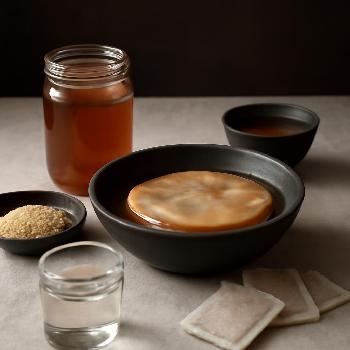Healthy & Special Diets > Fermented Foods Recipes (Healthy) > Kombucha Recipes (Healthy) > Homemade Kombucha Brewing
Classic Kombucha Brewing Guide
Learn how to brew your own delicious and healthy kombucha at home. This guide provides a step-by-step process for creating your own refreshing probiotic beverage, using simple ingredients and equipment. Enjoy experimenting with different flavors once you master the basics!

Ingredients
- 12 cups Filtered Water
- 1 cup Organic Cane Sugar
- 8 bags Organic Black or Green Tea Bags
- 1 cup Starter Kombucha Tea
- 1 SCOBY (Symbiotic Culture of Bacteria and Yeast)
Equipment Needed
Brewing the Sweet Tea
Bring 4 cups of filtered water to a boil in a saucepan. Remove from heat and stir in the sugar until dissolved. Add the tea bags and steep for 10-15 minutes. Remove the tea bags and let the tea cool to room temperature.
Preparing the Jar
Pour the cooled sweet tea into the 1-gallon glass jar. Add the remaining 8 cups of filtered water. This will bring the mixture to the correct temperature for the SCOBY.
Adding the SCOBY and Starter Tea
Gently place the SCOBY into the jar. Pour in the starter kombucha tea. This acidic liquid helps prevent mold growth.
Covering and Fermenting
Cover the jar with the breathable cloth and secure it with a rubber band. This allows air to circulate while preventing fruit flies and other contaminants from entering. Place the jar in a dark, room-temperature (68-78°F) location. Avoid direct sunlight.
Primary Fermentation
Allow the kombucha to ferment for 7-30 days. The fermentation time depends on the temperature, SCOBY activity, and desired tartness. Start tasting the kombucha after 7 days. Use a straw to draw a small sample. If it's too sweet, let it ferment longer. If it's too tart, it's ready.
Secondary Fermentation (Optional)
Once the kombucha has reached your desired tartness, remove the SCOBY and 1 cup of starter tea (for the next batch) and set aside in a clean jar with some kombucha to keep it moist. Pour the kombucha into bottles, leaving about an inch of headspace. Add fruit, juice, or herbs for flavoring (optional). Seal the bottles tightly and let them ferment at room temperature for 1-3 days for carbonation. Be careful, as this can create pressure. Burp the bottles daily to release excess CO2. Refrigerate to slow down fermentation.
Cleaning and Storage
Always use clean utensils and bottles. Store finished kombucha in the refrigerator to slow fermentation. Kombucha can be stored for several weeks in the refrigerator.
Nutrition Facts Estimated per 100g of product
Note: Nutritional information is an estimate and may vary.
Other Important Considerations for Nutrition
FAQ
-
What is a SCOBY?
SCOBY stands for Symbiotic Culture of Bacteria and Yeast. It's a living culture that ferments the sweet tea into kombucha. -
Can I use different types of tea?
Yes, you can experiment with different types of tea, such as green tea, white tea, or oolong tea. However, avoid using teas that contain oils, as they can harm the SCOBY. -
My kombucha is moldy. Is it safe to drink?
No. Moldy kombucha should be discarded. Healthy SCOBYs sometimes exhibit brown stringy bits. These are harmless yeast strands and a normal part of the fermentation process. -
How do I know when my kombucha is ready?
Taste it! The ideal kombucha has a balance of sweetness and tartness. The longer it ferments, the more tart it will become.
